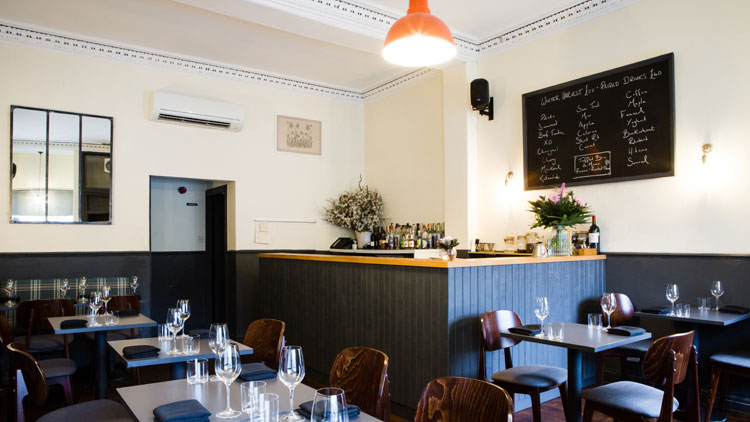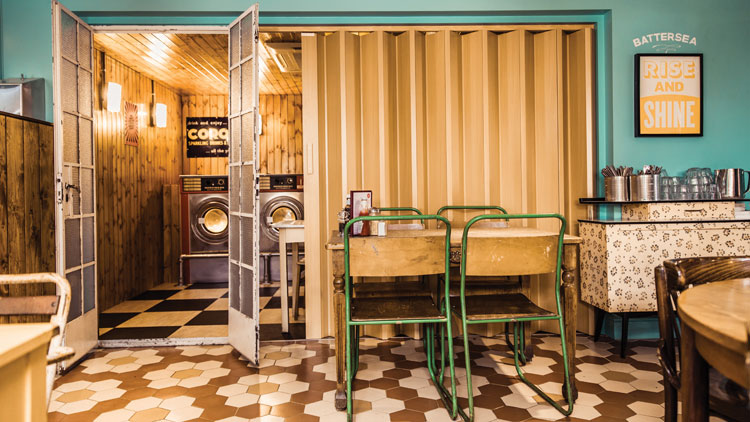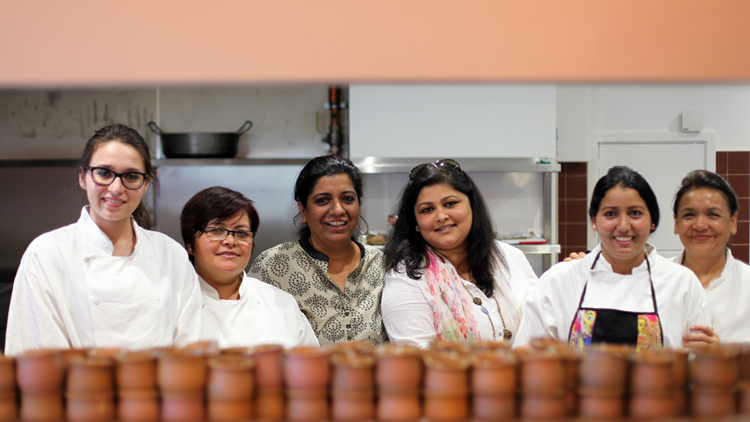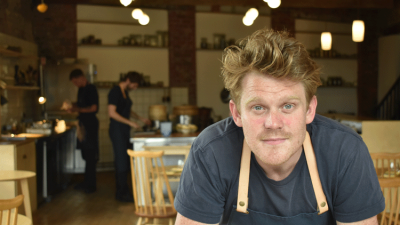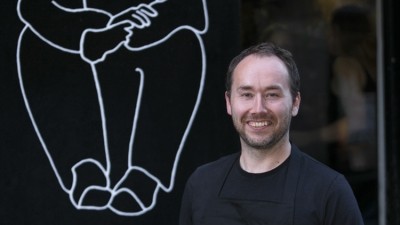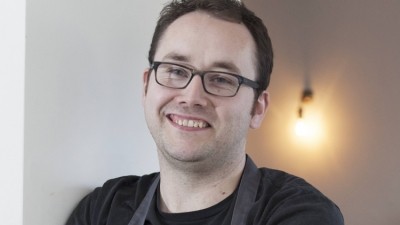How restaurants are getting creative to tackle staff shortages

At this time of acute staff shortages, the restaurant industry is finally waking up to the fact that, in order to recruit and retain good people, it must radically improve working conditions for even its most junior staff. But what does this mean in reality? How do you make those changes?
Restaurant spoke to four progressives businesses that, on numerous fronts – pay, hours, holidays, staff perks, healthcare and the industry’s general workplace culture – are forging a new sustainable model of employee relations. Is it time to reassess how you treat your most valuable asset?
The collaborative, creative hub
Where The Light Gets In, Stockport
At Where The Light Gets In (WTLGI), chef-owner Sam Buckley is determined to avoid the hierarchy common in restaurants. An ex-musician, he wants to foster creativity among staff. “One of my problems with kitchens is that people are stashed away for 15 hours-a-day with no sunlight and chefs and front-of-house get very introverted into their industry,” he says. “I want to look outwards. I want a pleasant working environment: better music, better conversations. I want there to be a notion of artistic merit to the food, wine and service we spend so much time on.”
From its open kitchen, a workspace built into the dining room, to its dinner-only Wednesday to Saturday opening hours and no-choice menu, WTLGI is designed to make working there liveable. The traditional model of huge menus, constant strain and “chefs barking at staff” undermines food quality, argues Buckley: “It’s important this restaurant is good for us.”
Buckley and manager Emma Underwood (who since this article was published has joined Mark Jarvis' upcoming Stem as restaurant manager) work with minimal formal structure. Daily briefings aside, staff manage their own time – “we choose intelligent people who can work autonomously,” says Buckley – and exchange of ideas is encouraged, as witnessed when a sommelier criticised elements of Buckley’s plating. “I’m egotistical but I will think about it,” was his response. “Some things hurt. Some don’t. I’m only human. But it’s good to take a battering.”
Empowering staff in this way can be frustrating, admits Underwood. For instance, a checklist had to be reintroduced for front-of-house maintenance jobs to ensure they are done. Staff do not always take the initiative. But we keep pushing, says Buckley: “In the kitchen, I want to stop sections and have a jobs list we check-off with everyone working in the centre. It could be chaotic, but I think it’s a modern approach to sharing skills and everyone watching each other’s work, quality-wise.”
WTLGI’s five chefs still work 60-hour weeks. Buckley is looking at that: “Why do we need to come in at 11am? And on Tuesday? I’m sure we can produce the food in less time.” But they do so at a venue where staff get six weeks’ paid holiday; where, instead of a lucrative private dining room, there is a staff room and library; where team-building activities include weekly yoga sessions; and where the chef de parties earn higher-than-average salaries. Yet, Underwood is paid less than many GMs. “It’s fine. I’m happy,” she says. “At my last place, I didn’t have a holiday in the first year. It’s about a better balance.”
Both concede that as a busy, nationally acclaimed restaurant in relatively inexpensive Stockport, WTLGI has a model that allows it to experiment. But, equally, the WTLGI concept is strong and its product is of a high quality because its employees are treated with respect. “I still act like a dictator sometimes. I’m still learning,” says Buckley. “But if you try and do the right thing, it has positive repercussions.”
The holistic hotel
The Gallivant, Camber, East Sussex
This interview is a little difficult for Gallivant owner, Harry Cragoe, given it requires him to confess that he has reversed his widely publicised decision to abolish tips. About 18 months ago, Cragoe put all his 30 hotel staff on at least £9-an-hour (above Living Wage Foundation rates) and, after some price adjustments, ditched tips in the restaurant. Relying on tips to make a decent wage is demeaning, argues Cragoe, and a poor way to incentivise employees. He imagined this move would trigger intense media coverage, huge customer interest and that other businesses would follow suit.
“In reality,” he concedes, “none of that happened.”
Consequently, last November, he reintroduced a discretionary service charge (note: wages remained at the new higher rate). “It was an interesting, expensive experiment. My business was probably £150,000 poorer as a result. I’m glad I did it but it felt like we were being mugs because, actually, not having service charge made us less able to reward staff. Whatever the tabloids suggest, the public are desensitised to it. We took the service charge off, nothing happened. We put it back, nothing happened.”
None of this changed Cragoe’s core belief that, particularly with Brexit looming, restaurants must radically rethink how they operate. “If you want to build something sustainable you need a happy team. This is a hard industry. People work insanely long hours and, historically, haven’t been paid very well and don’t get much validation. I began to challenge the industry norms, and I still am.”
That service charge is now allocated (without any deductions; indeed, the fund needs topping up) to a bonus scheme that pays out monthly/quarterly to staff who – according to guest feedback – have gone that extra mile. All staff also benefit from an annual profit share scheme. Although, as Cragoe stresses: “Pay is only one aspect of it.”
Increasingly, he is focused on a holistic package for staff, which includes nice uniforms; food every shift (“and not reheated breakfast”); real coffee; free English lessons; shorter out-of-season hours; free yoga and subsidised gym membership. Call it enlightened self-interest (it means fewer sick days and a more energetic team), but Cragoe is very keen on encouraging his staff to consider their health by offering free flu jabs, monitored exercise schedules, health checks and by bringing in experts to talk about managing diet and stress in hospitality.
Is this paying dividends in terms of staff retention? “Definitely,” insists Cragoe. “The core team is the best we’ve ever had. We don’t have the [staff] turnover we had two years ago and, unquestionably, they deliver a much better guest experience.”
The four-day operation
Aizle, Edinburgh
Last year, Aizle’s Stuart Ralston reached a crisis point common to many chef-owners. Inspired by the neo-bistros of Paris, his self-funded, 35-cover restaurant opened in 2014 with little fanfare, but, as positive reviews mounted, so did the pressure.
“The ambition of the restaurant had grown as had my workload,” says the 34-year-old chef. “I was exhausted, stressed, not seeing my family, doing 85-hour weeks, six days a week for months. I just thought: this is not sustainable. Something had to give.”
Ralston’s two-year-old son proved decisive, with the chef determined his business wouldn’t have a negative impact on his family life. “That was the biggest catalyst. I didn’t want to lose time with him. I didn’t want to be one of these tragedy divorce situations. Until [he was born], I never gave a second thought to my health, family, the countless weddings I’ve missed.”
Inspired by Restaurant Sat Bains and others, Ralston moved to a four-day week in January and has done so while increasing revenues despite all full-time staff remaining on the same wages.
This has been done with ingenious changes and investment. The restaurant’s set five-course menu went up from £45 to £55 (average spend is £80), but mainly to offset rent and business rate increases. And the restaurant was reconfigured to add four seats and now opens at 5pm, enabling greater table-turning. Aizle now averages 200 covers weekly where, previously, it was doing 180. Front-of-house staff, paid hourly, have maintained if not upped their tip income, while slightly reducing their hours.
“Let’s work smarter,” says Ralston. Kitchen staff thought they would have to be in at 7.30am rather than 8.30am to meet the new 5pm start. Instead, Ralston adjusted the menu so it was not so prep-heavy and installed a £32,000 stove that meant the kitchen can get the morning sauce and stock prep done quicker. “We’ve laid out money for a long-term solution,” he says.
The four-day-week is a reward to his dedicated staff (Ralston’s long-term sous chef and his restaurant manager have found it “a huge relief”) and an opportunity for this newly energised team to take Aizle to the next level. “I want to push the restaurant. I’m not giving up on that, and a four-day week can only improve the food. Often, last year, I wasn’t getting time to think. I’d get to Sunday, finish the big clean at 2am. Monday I’d sleep. Tuesday is family day. Then back in work Wednesday.
“The menu’s better than ever because I’ve been able to look at the balance of things, read books or go to see suppliers.”
That shorter week is also helping Ralston recruit from the same pool as Edinburgh’s top restaurants. “I can’t afford to pay astronomical wages, Aizle sous chefs earn around £22,000 plus £5,000 tips, so what can I do to be more attractive? A four-day week has to be an incentive.”
The socially responsible chain
The Breakfast Club
“I love this industry. I want hospitality to be an aspirational career. However, the economies of what we do mean we have to be creative,” says Jonathan Arana-Morton, co-founder of the 11-strong The Breakfast Club (TBC) chain. In terms of motivating and rewarding its 350 staff, TBC’s creativity takes many forms: £500 baby vouchers for new parents; share options for all – almost 10% of the business is owned by the team; and free six-month fitness programmes, including paid time off, that culminate in challenges such as marathons in the arctic circle.
In December, Arana-Morton took the Brighton branch to Barcelona for its Christmas party. “It looks like an extravagance, but it cost £700 to get them there. I could have given them £35 as a Christmas bonus and no one would notice. This generation values experiences over everything else. We’ve taken hundreds abroad over the years: Ibiza, Cancun, Vegas, Miami.”
Talking of holidays, head office staff and GMs are given 40 days off each year (everyone who has been with TBC for five years or more also gets an additional five, then six, etc, extra days’ holiday). “Treat people like adults. Tell them ‘here’s your holiday allocation, just deliver what’s expected’. I work with bright, talented people, they find a way,” says Arana-Morton.
Most remarkable, perhaps, is TBC’s volunteering programme run by Eva Arnaiz. Arnaiz joined TBC five years ago and suggested it could be working with community groups in more meaningful ways. She is now employed, full time, as TBC’s head of charities and communities.
Each site works individually with different local charities, running bespoke workshops, cookery schools or coffee mornings for all walks of life, including recovering addicts, refugee groups and isolated LGBT pensioners. This fulfils the founders’ desire to give back – “It has to start from personal principle,” says Arana-Morton – and it makes TBC an attractive employer to Millennials who, says Arnaiz, are politically engaged and seeking out socially responsible companies.
“You’re happiest when you work for a company you believe in. This isn’t why we do it – because it’s important – but we’ve had people apply for jobs with us who mention our charity work and it’s good for retention. We’ve been approached by landlords to go into places because of our community work, too.”
Under the banner Good Day Productions, TBC allocates 150 hours a month to volunteering, which willing staff then take up. While volunteering, those paid hourly, are paid London living wage rates; this is funded through various schemes within the business. Salaried staff can volunteer as often as they like.
“Hospitality is about looking after people,” says Arana-Morton. “The socially conscious people that [volunteering] attracts are going to excel.”
Three more progressive hospitality businesses
Darjeeling Express
Run by owner Asma Khan, this Soho-based Indian restaurant is different to others in that not only is it home to a kitchen brigade that has never cooked professionally, but one that is all female. The all-women team of housewives has run the kitchen from day one, with Khan keen to create a nurturing working environment.
Darjeeling Express also supports the Second Daughters Charity, with a percentage of its proceeds going to support and celebrate girls in Indian culture. The charity sends celebration packages to Kurseong, a small town in the district of Darjeeling, for the birth of the second daughters in families and continues to support the recipients through their education.
New World Trading Company
This pub and bar company is known for encouraging its young and dynamic workforce (more than 60% of its 900-strong workforce are aged under 26) to learn new skills, including non-work-related pursuits such as language classes and music lessons.
According to The Sunday Times list of 100 Best Companies to Work for 2018, in which it was ranked 10th, staff compete to earn points to win extra days off or holidays abroad. Points can be earned in different ways, including charitable fundraising, random acts of kindness and high scores from mystery diners. It works – employees give their team-mates the top score in The Sunday Times survey for being fun to work with (92%).
Hawksmoor
The steakhouse group is one of a number of small restaurant chains to take a stand against the hospitality industry’s long-hours culture. Managers monitor waiters or chefs who work more than 52 hours in a week, and last year the proportion working more than 52 hours was cut to 10%, with just 1% topping 60 hours, says The Sunday Times.
The company is known for paying a comparatively good wage, with 23% of staff earning more than £35,000 a year. Hawksmoor also takes a strong ethical and environmental stance that makes it an attractive place to work; it is a founding member of the Sustainable Restaurant Association and more recently removed plastic straws from its restaurants, replacing them with a reusable metal tube or a biodegradable straw.
This feature first appeared in the April issue of Restaurant magazine, the leading title for the UK’s restaurant industry. For more features, comment, interviews and in-depth analysis of the restaurant sector subscribe to Restaurant magazine here.


